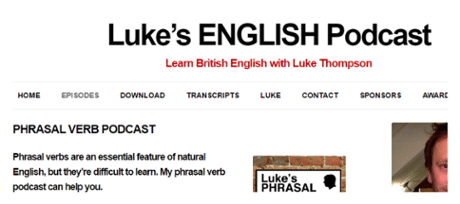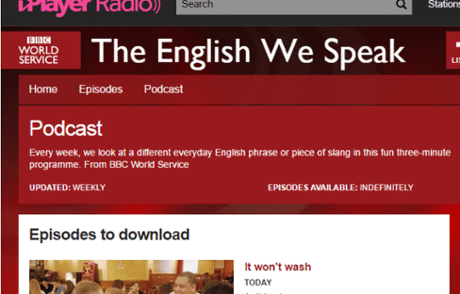Why we love… practising listening with Podcasts
Listening can prove to be one of the most difficult skills to improve, especially for students who don’t live in an English-speaking country. Students sometimes feel nervous or even afraid of listening, perhaps because there are so many accents or because they think they don’t have a high enough level of grammar to understand what they’ll be listening to.
This fear is often comes from a result of lack of practice. Although some students listen to songs and movies, this isn’t enough. Songs would not necessarily help you follow a conversation or other types of spoken interaction. Similarly with movies, while they offer language learners a rich source of expressions in context, by their very nature movies are visual, and these moving images can help you understand what’s going on, so you don’t need to listen quite so hard.
To truly improve your listening, you need to practise and get exposure to different accents and situations as much as possible. You also need to make sure that you like what you are listening to engage properly with the content. One really great way to improve your listening is with podcasts.
What are Podcasts?
Podcasts are audio programmes made by someone who then posts them on the Internet. They are very similar to radio shows, but the great thing is you can download them to your phone, tablet or computer and listen to them wherever and whenever you want. Another great thing about them is that they cover nearly any topic you are interested in, whether it be football, movies, science, fashion or language.
Some students might say that one big issue with these podcasts is that they are difficult for learners of English at lower levels to understand. But there are also some podcasts that are specifically aimed at English language learners from elementary to advanced:
Elementary
The British Council have a wide variety of podcasts that are aimed specifically at elementary levels. They cover a vast range of everyday topics and situations with a real-life feel to them. They also provide exercises and activities that can be used to help you better understand the content:
https://learnenglish.britishcouncil.org/en/elementary-podcasts

PodcastsinEnglish also provides a lot of semi-authentic material that contains extra materials for students to work from. We advise our elementary students to start from level 1, and you can work your way up from there.
The one disadvantage with this podcast is that you will have to pay to use some of the extra tasks. But, if you really want to improve your listening, it could be a great tool. Give it a try!
Intermediate
A great website that provides podcasts that are more challenging is ZappEnglish
. These podcasts are certainly quite professionally made and a lot of work gets put into them. They are free to listen, however, if you want to read the transcripts you will need to pay.
Another good podcast for intermediate students is teacherluke.co.uk. This podcast is sometimes quite funny and is made by someone who has a wealth of experience teaching. Teacher Luke even includes podcasts that focus on teaching phrasal verbs, which can be really useful for those who have difficulty understanding them.

Upper intermediate / Advanced
Advanced student should already be listening to authentic material. However, the BBC have a weekly podcast that specifically looks at figurative and more obscure language in context. This might really interest higher level learners. Go to the BBC’s The English We Speak webpage to see a list of their fun 3-minute podcasts that each focus on a different piece of colloquial language.

Listening is not something that comes easy to most learners, so we recommend practising and listening to podcasts such as these as much as possible. Find ones that you like, build up your playlist and then go back and listen to new ones as they are posted.
Task
Get together with a classmate to do these tasks at the same time.
1) Subscribe to a podcast yourself. To do this, you can use iTunes to download a ready-made podcast from the BBC website. iTunes is free and you do not need to use an Apple device or have a Mac computer to use iTunes. Remember, though, there are other free alternatives to iTunes. You could, for example, try downloading and managing your podcasts with HermesPod, or Soundcloud or Stitcher. Soundcloud and Stitcher offer access to a world of music and radio shows as well.
2) Download our Podcast Worksheet word document (.doc) and save and open it on your computer. Choose at least three of the podcasts, listen to them, and write a few comments in each section of the table. You can type your comments in the document on your computer, or you can print it out and do it with pen and paper.
3) Meet up with the classmate who is also doing these tasks. Exchange your thoughts and opinions on the different podcasts. Do you like and dislike similar things about them? Choose which podcast you like best, and would recommend to others at your level.
Let us know how you get on or if you have any questions. You can always contact us, just click below:
Other great learning tools are:
